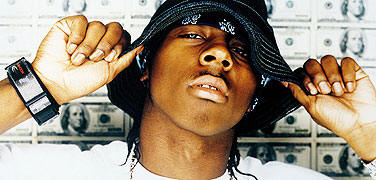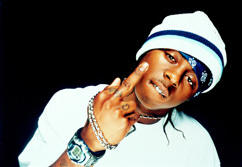|
Lil Wayne

It’s no small wonder Lil Wayne thinks
like a mastermind. Since his adolescence, he has
displayed exceptional talent. Hailing from the tough
streets of Hollygrove in the 17th Ward of New Orleans,
he was first recruited by Cash Money bosses Bryan “Baby”
Williams and Ronald “Slim” Williams. At a mere 11 years
old, he had become the youngest artist on the Cash Money
roster. The Williams’ brothers tweaked and groomed
Wayne’s style, rearing him on early Cash Money artists
like Pimp Daddy, UNLV, and BG. Starting off as a member
of the super group, The Hot Boys (Juvenile, BG, Turk and
Lil Wayne), Wayne shined as a true emerging rap talent,
catapulting his solo career. Now, at the ripe age of 20,
it is time for him to step out once again. The Carter
marks his fourth solo effort and Young Money/Cash Money
Records signifies his very own record label.
Since the release of his last solo album 500 Degrees
(2002), Wayne has been diligently working on The Carter
and Young Money Records. In 1999, Lil Wayne's solo debut
Tha Block Is Hot set the platform for the artist’s
success. Until this day, Tha Block Is Hot remains one of
Cash Money's most triumphant efforts. Lil Wayne’s
signature spitfire flow spewed from his wiry, blinged-out
frame has made him one of the most recognizable figures
in hip-hop. Combining his uncanny charisma of yesterday
with his seasoned demeanor of today, The Carter takes
listeners on a journey unlike that of any before.
Lil Wayne’s old soul wisdom manifests itself in clever
rhymes that balanced the young hustler's lifestyle with
a sense of street reared insight. On a tribute to The
Hot Boy brotherhood “Man, I Miss My Dogs,” Wayne’s sound
is mature and exhibits much more skill. His voice is
confident, deeper, and raspier than before. The
body-bouncing first single, "Get Something," features
party starter Mannie Fresh on the hook. As for the
thematic content of his music, Wayne tackles more adult
subjects including navigating life’s paths, being a
father, and managing money as a youth. The track “Ain’t
That A B!%$h” best exemplifies his growth as an artist.
The song is an introspective account of the various
misfortunes one confronts in life. Moreover, songs like
"Travelin’," speak candidly to the experience Wayne has
undergone in his tenure as a young hip-hop star. Here,
Lil Wayne raps about the assortment of neighborhoods and
communities he has seen in his voyages.
Production on the album comes courtesy of resident Cash
Money beat machine Mannie Fresh, who laced Lil Wayne
 with
an arsenal of digital funk grooves. “I will always stay
true to Mannie Fresh,” says Wayne, “a Fresh beat was the
first beat I ever rapped to. It's like he gets younger
instead of older because he's so in tune with everything
going on in music." Rising southern producer Jazze Pha
adds in his instrumental composition ideals along with
Raj Smoove, Lil Wayne’s personally handpicked Young
Money/Cash Money producer, rounding out the project. with
an arsenal of digital funk grooves. “I will always stay
true to Mannie Fresh,” says Wayne, “a Fresh beat was the
first beat I ever rapped to. It's like he gets younger
instead of older because he's so in tune with everything
going on in music." Rising southern producer Jazze Pha
adds in his instrumental composition ideals along with
Raj Smoove, Lil Wayne’s personally handpicked Young
Money/Cash Money producer, rounding out the project.
With four records to his credit, Wayne has succeeded in
acting as a catalyst in the growth of southern hip-hop.
"I love how the south is moving,” Wayne affirms like a
proud father, “what David Banner, Lil’ Flip and all of
them are doing is hot. When we started, Baby and Slim
declared the south was going to blow up and we did."
Partially responsible for this positive wave of southern
musical gems, Wayne is launching his own record label to
enhance the flourishing tradition of the south.
Mix tape superstars, Squad Up, are Wayne’s Young
Money/Cash Money Records debut group. The six-man
collective including Wayne has acquired much underground
success with their contributions to the street savvy,
southern mix tape scene. "Young Money is another leaf
that will fall from the Cash Money tree," states Wayne.
With a new album, The Carter, on the horizon, a record
label, Young Money/Cash Money Records, launch pending
and an integral role in one of hip-hop’s most creative
crews, Lil Wayne continues to prolifically govern the
game, New Jack City style.
|